Man Refuses To Pet Woman's Dog Roaming Free On A Flight, So Woman Swears At Him
BananaRamaRepublic69 shared a post on the "AITA" subreddit about a recent flight he took, where he encountered a service dog that was walking around the aisle and interacting with passengers. According to the post, the dog was walking around on its own, and people were petting it.
When BananaRamaRepublic69 asked a flight attendant about the dog, she told him that it was a service dog and that there was nothing they could do. BananaRamaRepublic69 said the dog came up to him at some point and put its legs on him, looking up at him as if it wanted to be petted.
BananaRamaRepublic69 moved his legs away and lifted them up onto his seat. He then yelled out for someone to come get their dog.
A woman in her 20s came over to take the dog away, and BananaRamaRepublic69 told her to control her dog and keep it in its carrier. The woman told him to "F off" and that he ruined her dog's good time.
Throughout the flight, the woman made snide comments about BananaRamaRepublic69 to other passengers who approached her to say they enjoyed the dog. BananaRamaRepublic69 wants to know if he was the a-hole in this situation.
Here's how the AITA community responded.
Here's how it started.
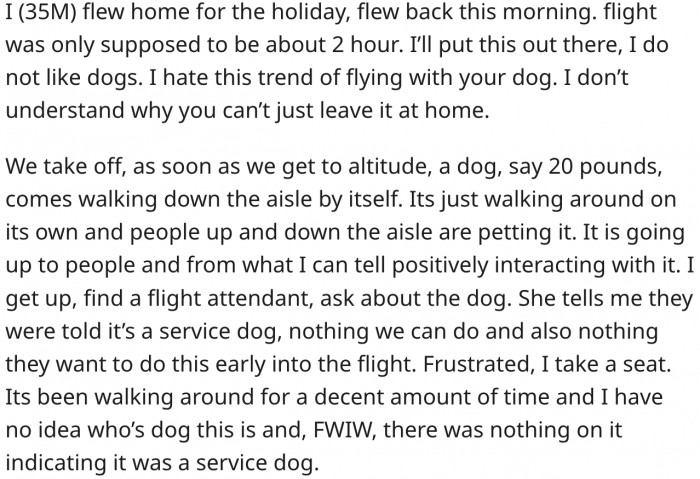
She swore at him for not petting her dog. Reddit responds.
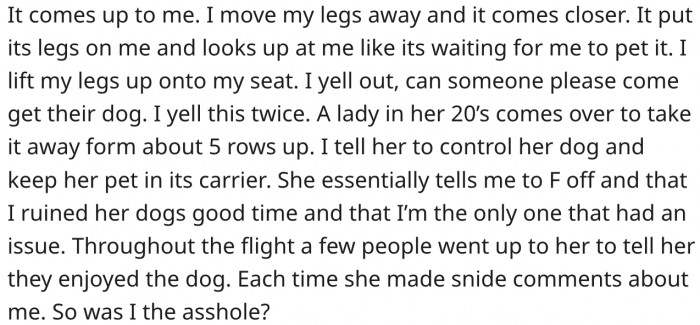
1. Service dogs don't wander around by themselves.

Understanding Anxiety and Fear Responses
Dr. Sarah Jones, a clinical psychologist specializing in anxiety disorders, explains that fear responses in public spaces, particularly with animals, can trigger intense emotional reactions.
In this case, the woman's reaction to the man not petting her dog may reflect her own anxiety about the dog's safety and behavior.
Research indicates that individuals often project their fears onto others in social situations, impacting how they interact with both people and animals.
Understanding Service Dogs and Public Spaces
The dynamics of service animals in public spaces can be complex and often misunderstood. According to Dr. Alexandra Solomon, a relationship therapist, "Understanding the boundaries and responsibilities that come with having a service animal is essential for fostering a respectful environment." This legal framework emphasizes the importance of control and training, which are critical in ensuring safety and comfort for everyone involved. The man's request for the woman to control her dog on the flight reflects a legitimate concern for safety, particularly in confined spaces where interactions can escalate quickly. As Dr. Solomon notes, "In shared spaces, it's vital to prioritize the comfort of all individuals, including those with allergies or fears."
2. It's irresponsible to let dogs roam freely on a flight.

3. The dog's owner lied about it being a service dog.
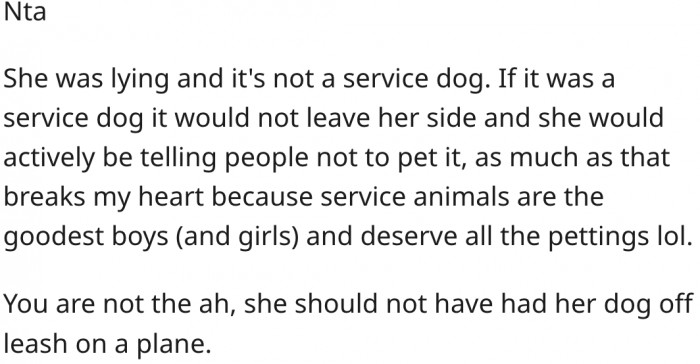
4. Just because some people like dogs doesn't mean others must like them too.
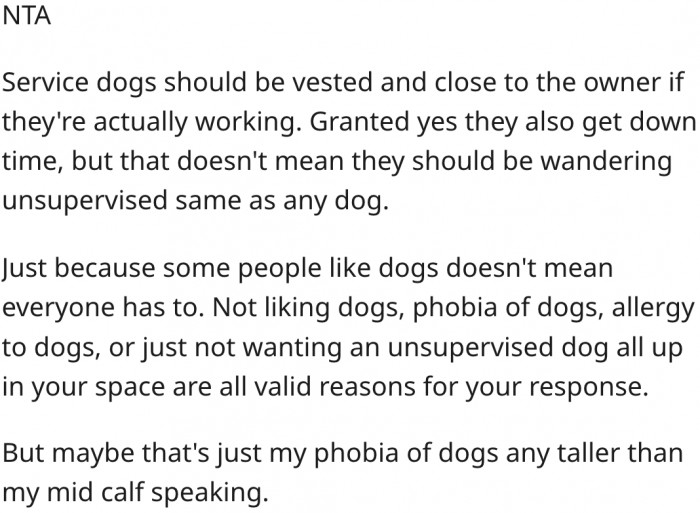
Moreover, studies show that service animals are often treated with a level of expectation that can heighten tensions in crowded environments like flights.
When individuals do not comply with unwritten social norms regarding service animals, it can lead to frustration and conflict, as seen in this scenario.
Moreover, the psychological implications of having a dog in a stressful environment like a flight can affect both the pet and the passengers. Research shows that animals can pick up on their owner's anxiety, potentially leading to disruptive behavior. This highlights the need for owners to understand their pet's needs and behavior, especially in public settings.
5. It's unfair that people hate cats but are not allowed to dislike dogs.
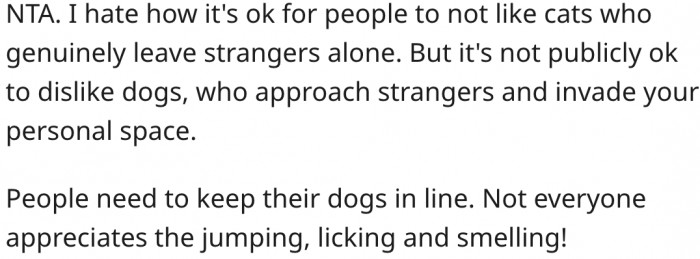
6. Some people are terrified of dogs.

7. There's a likelihood that some people were happy when he told the dog's owner to control their dog.
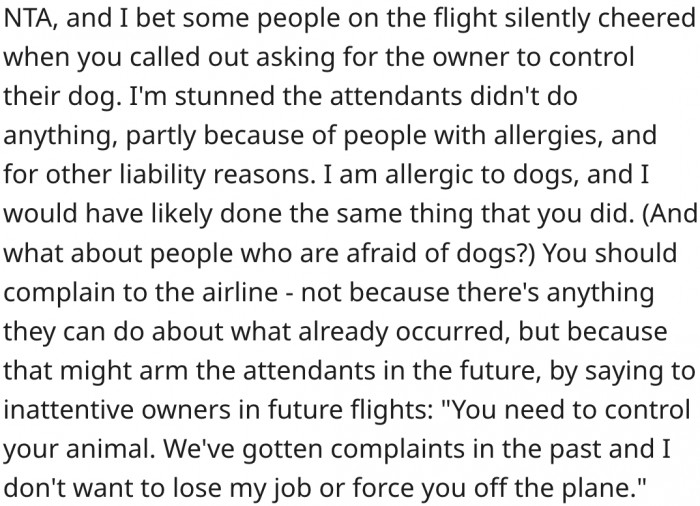
The Importance of Social Norms
Social norms play a significant role in shaping behaviors in public spaces. According to Dr. Ramani Durvasula, a clinical psychologist, "People often navigate social expectations based on their surroundings, especially in unfamiliar environments." The man's request for the dog to be controlled likely stems from an instinctive desire for personal safety and comfort, which is a natural response in crowded settings. Dr. Durvasula adds, "In crowded places, individuals may feel heightened anxiety, prompting them to seek control over their immediate environment."
The Intersection of Personal Rights and Community Responsibility
Balancing personal rights with community responsibility is a recurring theme in public interactions involving pets. A licensed psychologist specializing in social behavior might argue that while individuals have the right to bring their service animals into public spaces, they also have a responsibility to ensure that these animals do not disrupt others.
Studies indicate that conflicts can arise when personal freedoms are perceived to infringe upon the comfort of others, especially in tightly packed environments such as airplanes.
8. People shouldn't be forced to interact with strange dogs.

9. The airline should have done something about the situation.
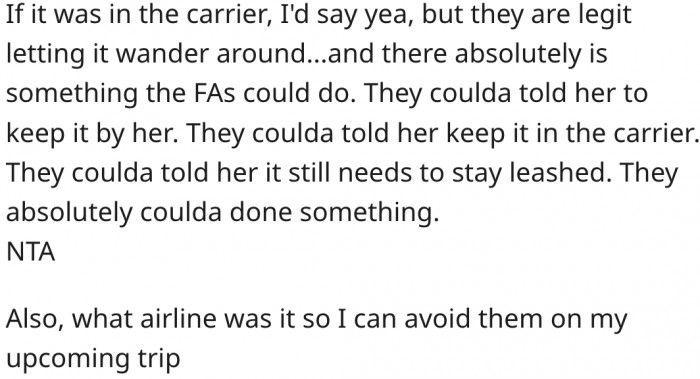
10. Dogs should be on leashes when on planes.
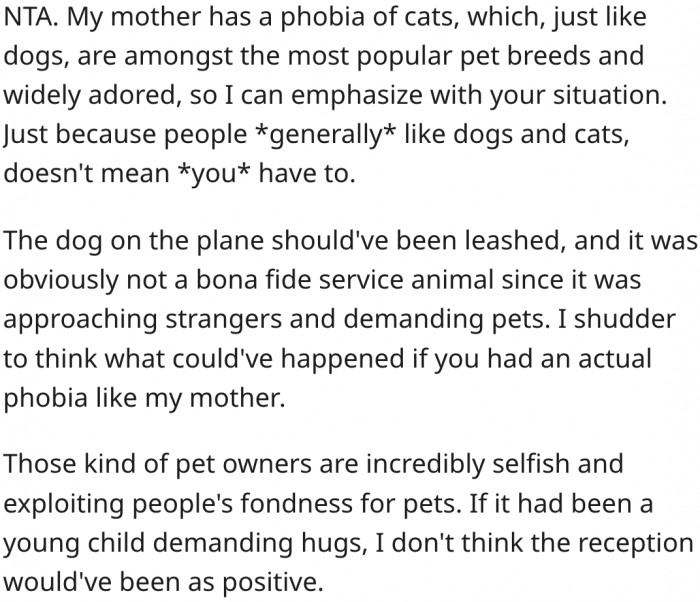
Understanding these social dynamics can help individuals navigate conflicts more effectively. Encouraging open dialogue about the roles and behaviors of service animals can lead to better understanding and cooperation among passengers.
Strategies might include educating fellow travelers about service animals and their importance in supporting individuals with disabilities.
A practical approach would involve educating pet owners about the importance of training and control, especially in public settings. Providing resources on effective obedience training can equip owners with the skills necessary to manage their dogs in various situations. Furthermore, advocating for designated areas where service animals can relieve themselves away from public spaces can help mitigate potential conflicts.
11. Pets shouldn't be treated like children.
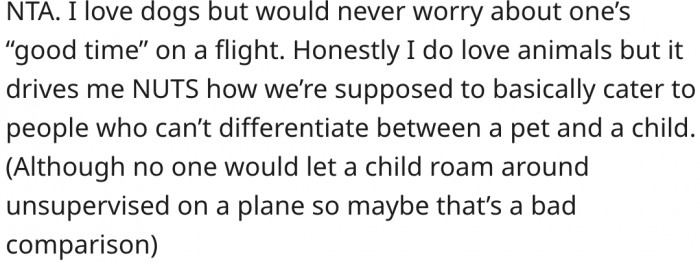
12. It's unsafe to let pets wander freely.

13. No pet is allowed to roam freely on a plane.

Examining Emotional Responses
Emotional reactions in public spaces often stem from underlying stressors. According to Dr. Lisa Green, an expert in emotional processing, crowded environments can exacerbate feelings of vulnerability and anxiety.
This can lead to defensive behaviors, as individuals feel threatened by their surroundings or the actions of others.
14. He deserves a refund of his flight ticket.

15. Service dogs should be controlled.
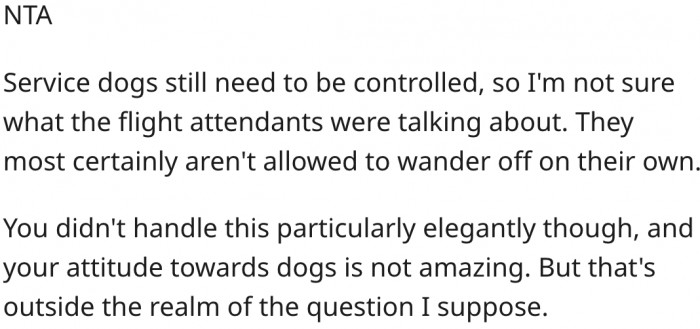
16. He should file a complaint with the airline.

Creating a culture of empathy and understanding around service animals can help alleviate these tensions. Encouraging passengers to approach conflicts with curiosity rather than defensiveness can foster a more supportive atmosphere.
17. You're not supposed to pet service dogs.

18. Most dog owners are extremely entitled.
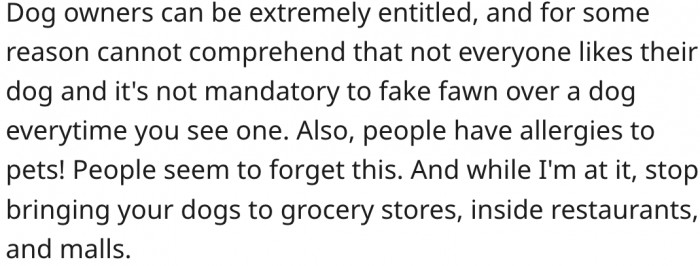
19. Service dogs are supposed to be with their handler at all times.
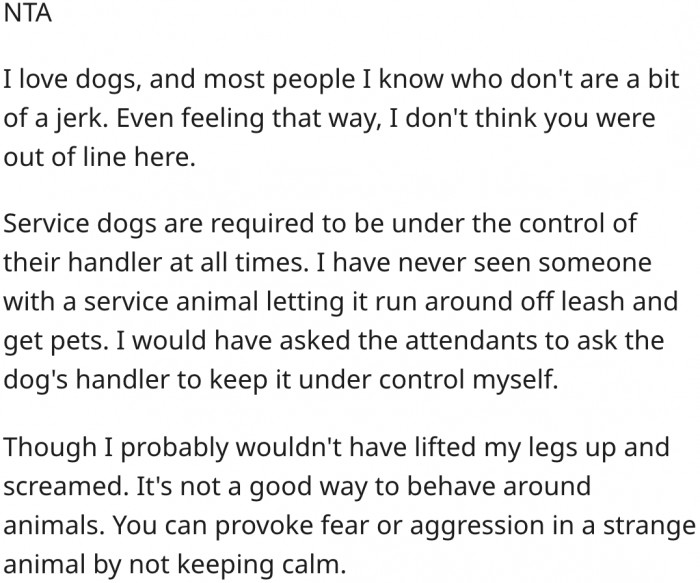
Developing Conflict Resolution Skills
Conflict resolution skills are essential for navigating emotionally charged situations. Research indicates that training in these skills can significantly reduce misunderstandings and promote cooperation.
In such scenarios, establishing clear communication about needs and expectations can lead to better outcomes for all parties involved.
20. Dog owners should learn to respect other people's space.
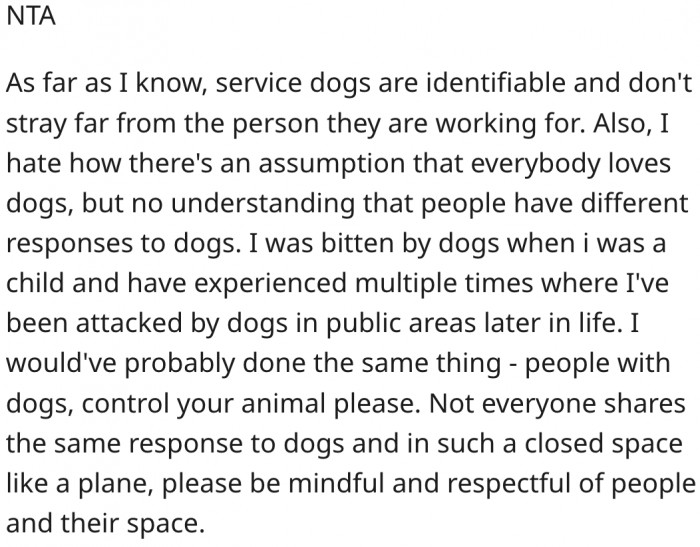
What Do You Think?
When it comes to traveling with dogs, owners need to be responsible and considerate of the needs and comfort of others.
Allowing a dog to roam freely in public spaces, such as on a flight, can pose a risk of injury to the dog and can also be disruptive or uncomfortable for other people.
It is generally not appropriate for dog owners to allow their dogs to roam freely in public. Instead, dogs should be kept under the control of their owners at all times, either on a leash or in a carrier.
This ensures the safety and comfort of both the dog and other people. What do you think?
Psychological Analysis
This scenario illustrates the tension that can arise between individual rights and communal comfort. The man's insistence on control reflects a common concern for safety in public spaces. Encouraging dialogue about the responsibilities that come with service animals can lead to better outcomes for everyone involved.
Analysis generated by AI
Analysis & Alternative Approaches
In conclusion, the interaction between service animals and the public is fraught with challenges that require sensitivity and understanding from all parties involved. Dr. Ramani Durvasula, a clinical psychologist, emphasizes that "empathy is crucial in navigating shared spaces, especially when it comes to service animals and their handlers." Clear guidelines and training can help ensure that both service animals and the people around them can coexist peacefully. As noted on her professional website, Dr. Ramani advocates for fostering understanding to resolve conflicts effectively.
Practical strategies could include having designated areas for service animals or providing educational resources for passengers on how to interact with service animals respectfully.
Addressing concerns proactively can help create a safer and more comfortable environment for everyone on board.
Analysis & Alternative Approaches
In summary, understanding the emotional and social dynamics surrounding service animals is crucial for navigating public spaces. By fostering open communication and empathy, individuals can work towards minimizing conflicts.
Ultimately, the goal should be to create a more accommodating environment where everyone's needs, including those of service animals and their handlers, are respected.



